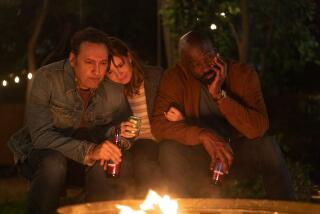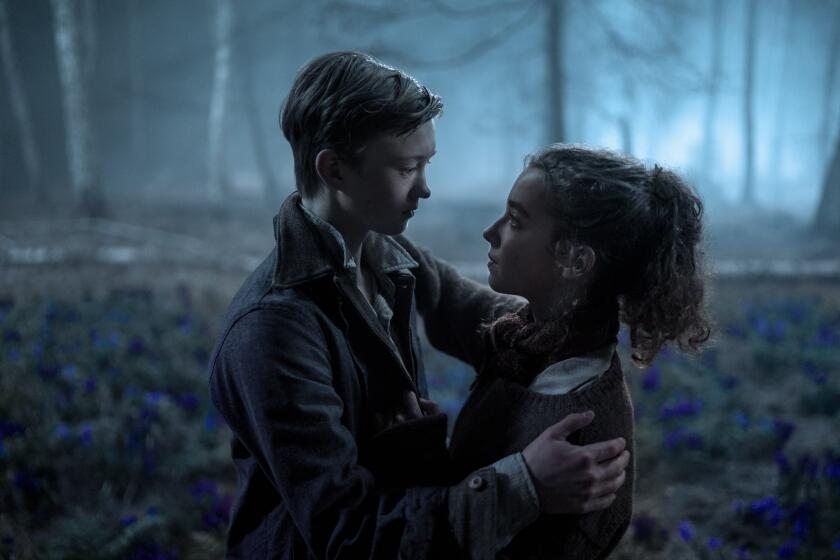‘Antichrist’ is controversial, but therapeutic for director Lars von Trier
CANNES, FRANCE — His hallucinatory horror film “Antichrist” elicited derisive giggles and howls from an irate media audience. Later, he was booed at his own news conference. But Lars von Trier is insisting, as he so often does, that he never intended to play the provocateur.
“If somebody asked me to make a provoking film, I wouldn’t know how to do it,” Von Trier said in an interview at the Hotel du Cap, a luxury resort up the coast from the bustle of the Croisette. “I didn’t expect it but there’s been a lot of hostility. It seems the film kind of gets to people somehow.”
That would be an understatement. Sunday night’s media screening of the Danish master prankster’s “Antichrist” offered electrifying proof, as if more were needed, that he knows how to get a reaction. Laughter greeted the opening titles (“Lars von Trier Antichrist”) as well as the punch line, a brazenly incongruous dedication to the late Russian auteur Andrei Tarkovsky.
A crescendoing shriek of psychosexual guilt and anxiety -- starring Willem Dafoe and Charlotte Gainsbourg as a bereft couple who retreat to a remote cabin in the woods -- the movie was met with guffaws and gasps, not least for a pair of instantly notorious scenes in which gruesome fates befall the characters’ genitalia. As the credits rolled, jeers erupted along with applause.
Von Trier, 53, has been a Cannes fixture as long as he has been making movies. Except for 2006’s “The Boss of It All,” all of his features have premiered here, and he won the Palme d’Or in 2000 for “Dancer in the Dark.” Two years ago, to mark its 60th anniversary, the festival invited more than 30 directors to make a short about the film-going experience. Von Trier’s was set at the Cannes premiere of 2005’s “Manderlay.” A critic regales the man next to him, who happens to be Von Trier, with tedious banalities. When he finally asks his seatmate what he does for a living, the director responds, “I kill.” He then produces a hammer and bludgeons the man to death.
Does that wry little skit sum up Von Trier’s feelings about critics and Cannes? He laughed: “On some level,” he said. “But the festival has been very, very kind to me.” Accordingly he makes the effort to get here. Because of his well-documented fear of flying, he has never been to the United States, even though several of his films, including “Antichrist,” are set there -- and travels to Cannes by camper van from Denmark. While here, he remains holed up at the du Cap, only venturing into the maw of the festival for his official screening and conference.
Von Trier is a canny ringmaster of the Cannes media circus, as he showed with his deft handling of the aggressive interrogation at Monday’s news conference. A British journalist asked Von Trier to “justify” the movie, and the hostility only spurred him to greater heights of comic arrogance. “I’m the best filmmaker in the world,” he said, almost with a shrug, as if puzzled that anyone could miss this self-evident fact.
But facing his inquisitors one on one, Von Trier seemed genuinely weary. Flush from being out in the sun for TV interviews, he asked to retreat into the shade of a cabana. He had in front of him a packet of tissues, a bottle of hand sanitizer and a Coke, all of which he kept fidgeting with as he talked. “Maybe I’m getting too old for this,” he said. “I feel kind of intimidated.”
Von Trier can be opaque when discussing his films, but he is notably open on the subject of his mental health. He has talked openly about his neuroses and phobias, and has repeatedly said that “Antichrist” is his response to a debilitating depression that left him unable to work.
“It comes quite naturally to me, to tell people about my anxieties,” he said. “I’m sure a lot of people are very tired of hearing about my mental condition. But being married has taught me that it’s always easier to tell the truth, or anyway, lie as close to the truth as possible.”
Besides, he sees these fits of (apparent) candor as a service to journalists. “As a victim of an interview,” he added drolly, “you always try to make it a good one, so you have to say something.”
The husband and wife in “Antichrist” represent personal fixations for Von Trier. The Gainsbourg character is an academic who has been doing research on systematic persecution of women and witch hunts; Von Trier draws accusations of misogyny almost every time he makes a film. Dafoe plays a therapist; Von Trier said he has been undergoing cognitive therapy. Guilty and grief-stricken over the death of her young son, the wife gets rid of her mood-stabilizing pills, and is compelled by her husband to face her morbid fear of nature; Going off medication and confronting dysfunctional thoughts are true to the method as Von Trier has experienced it.
The grisly conclusion of “Antichrist” suggests that this therapeutic approach leaves much to be desired. “I’m being a little sarcastic, but that’s my way,” Von Trier said. “I don’t think cognitive therapy is a miracle cure, but it’s what works right now.”
The making of “Antichrist” has proved restorative, simply for having coaxed him back into a routine. But the process was different this time. The movie came to him “like a dream,” he said. “I’m mathematical so it’s really difficult not to arrange things.” But with “Antichrist,” “I was trying to leave behind logic as much as I can.”
No one’s idea of an easy sell (although the curiosity factor will be high), “Antichrist” has been acquired for the U.S. by IFC Films, which plans to release it uncut in theaters, and in an edited version, to be supervised by Von Trier, for television. “I can’t say no to censorship,” Von Trier said. “The only thing that is important to me is that somebody somewhere knows that there is an original.”
One of the graphic scenes, he noted, is a cinephilic homage (warning: a spoiler follows). The Dafoe character, after a grievous injury to his nether regions, is brought to a bloody orgasm. “That’s from ‘Mean Streets,’ ” Von Trier said, referring to Martin Scorsese’s 1973 film, and to a guilt-ridden dream that Harvey Keitel’s character has about premature ejaculation. Von Trier said he ran into Scorsese earlier in the festival, and told him that “Antichrist” contained a tribute: “I think he was pleased.”
But had Scorsese seen “Antichrist” yet?
“No,” Von Trier said with a laugh. “But he might have now.”
--
More to Read
Only good movies
Get the Indie Focus newsletter, Mark Olsen's weekly guide to the world of cinema.
You may occasionally receive promotional content from the Los Angeles Times.










